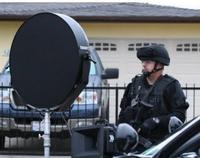-
Lawmakers question Napolitano on border-security measurement methods
Senators Tuesday grilled DHS secretary Janet Napolitano on what methods her department will use to provide a “meaningful” border-security measurement, which is a key condition for implementing a bipartisan immigration reform legislation unveiled last week.
-
-
Reducing border inspections delays will benefit U.S. economy
Inspection of people and vehicles at U.S. border crossings are vital to homeland security. Inspections, however, generate various spillover effects relating to the delays in the flows of passengers and cargo across U.S. borders. A new study concludes that adding thirty-three customs and border protection officers (one at each of the selected thirty-three land and airport locations studied) will potentially lead to an increase in GDP of $61.8 million and employment gains of 1,053 jobs in the United States.
-
-
Proposed budget shows DHS will have to do with less
The administration’s proposed 2013 budget shows that DHS will have to do with less: the department $39 billion is $625 million less than the department’s2012 budget, and, in addition, the department has committed to save an additional $1.3 billion by reducing administrative costs. Among the big-ticket items in the new budget: $714 million for a state-of-the-art animal disease lab; $494 million to fund research and development in cybersecurity, explosives detection, and chemical/biological response systems; and $221 million for 1,600 additional Border Patrol agents.
-
-
Texas Republican lawmakers introduce border security bill

Two Texas Republican legislators have introduced a bill which will mandate that DHS meet several demanding border security standards, but said that these standards will not delay progress on immigration reform. Senator John Cronyn (R-Texas) and Representative Michael McCaul (R-Texas) filed the Border Security Act of 2013 on Tuesday. The bill requires, among other things, that DHS return to reporting how much of the border is under “operational control,” reporting which the agency discontinued in 2010.
-
-
Napolitano’s arguments about border security undermined by rise in arrests

As recently as last Thursday, DHS secretary Janet Napolitano said that border security is at its most robust in years. New numbers released on the same day tell a different story about activity on the border: arrests on the border are up 13 percent compared to this time last year, from 170,223 last year to 192,298 this year. Napolitano argues that arrests alone are not a reflection of how secure the border is, and that crime statistics in border regions – a better measure of border security, she says — are down from previous years.
-
-
More border security means more business opportunities for tech companies

At last month’s Border Security Expo in Phoenix, both start-ups and established companies showed off their inventions in an effort to pitch projects to federal agencies. Two themes emerged in the show: the expo demonstrated that many of the systems and weapons systems that were used in the Iraq and Afghanistan wars are now becoming available to local, state, and federal law enforcement agencies – and companies expressed concern about the impact the federal budget cuts will have on their pockets.
-
-
CBP rethinks budget cuts-related furloughs, over-time reductions
Facing mounting criticism by political leaders and law enforcement in border states, the Customs and Border Protection (CBP) agency has decided to delay the implementation of two-week furloughs and cuts to overtime hours to its employees. The furloughs were originally set to begin later this month, and some said that reduction in hours worked by front-line personnel would have reduced security along the border.
-
-
Bipartisan Group of Eight to unveil immigration reform bill in early April
The bipartisan group of senators known as the Group of Eight, currently finalizing the details of a sweeping immigration bill, said on Wednesday that they will be ready to unveil their plan to Congress when it gets back to work in April. Four of the senators visited the U.S.-Mexico border to observe security operations along the border first hand.
-
-
El Paso to hire more border officers to compensate for CBP budget cuts
In El Paso, Texas, more than 100,000 residents depend on the activity across the bridges which connect the United States to Mexico. This includes $80 billion in trade a year that crosses the El Paso bridges and millions of shoppers who cross our bridges who spend more than $1.4 billion in the El Paso economy. Sequestration-related cuts, by promising longer wait times at border crossings, will hurt the local economy, and the El Paso city council is looking for ways to minimize the damage.
-
-
DHS late developing new measure for border security
A little more than two years ago, DHS officials told Congress that they would design a new method to produce more accurate statistics on security along the nation’s border. Last week the department acknowledged that it has not developed this method yet, and will not for some time.
-
-
Rise in the number of border-crossers dying along the U.S.-Mexico border
While fewer people are crossing the border between Mexico and the United States, the region saw a significant spike in immigrant deaths last year, according to a report released on Tuesday. the U.S. Border Patrol identified 477 deaths along the border, a 27 percent increase from the 375 deaths in 2012.
-
-
Was Mexican border firefight killing 40 real?
It would seem that drug violence only stops at the Mexican border in the imaginations of Washington politicians. On example: Mexican journalists, because of fear for their own lives and the safety of their families, are increasingly reluctant to cover drug cartels’ violence and mayhem. What has occurred in recent months is that American reporters located in American border cities also have stopped reporting on drug-related violence across the border for the same reasons as their Mexican counterparts.
-
-
CBP faces lawsuits over treatment of illegal immigrants
A number of U.S. Citizens along with illegal immigrants have filed several lawsuits on Tuesday against Customs and Border Protection (CBP) claiming they were abused and subjected to cruel tactics, including being forced to sit in freezing holding cells for day at a time.
-
-
CBP sends out furlough notices to agency employees
The Customs and Border Protection (CBP) has started sending furlough notices to its employees, the result of the agency’s need to cope with a 5 percent sequestration-related reduction in salaries and expenses. Border patrol agents say the cuts will hobble efforts to make the border more secure.
-
-
DHS reasserts right for search and seizure without probable cause
Thousands of times a year people are stopped as they cross into the United States, and their cell phones, tablets, and laptops are taken from them. Their e-mails and photos and other important documents are searched thoroughly without probable cause.
-
- All
- Regional
- Water
- Biometrics
- Borders/Immig
- Business
- Cybersecurity
- Detection
- Disasters
- Government
- Infrastructure
- International
- Public health
- Public Safety
- Communication interoperabillity
- Emergency services
- Emergency medical services
- Fire
- First response
- IEDs
- Law Enforcement
- Law Enforcement Technology
- Military technology
- Nonlethal weapons
- Nuclear weapons
- Personal protection equipment
- Police
- Notification /alert systems
- Situational awareness
- Weapons systems
- Sci-Tech
- Sector Reports
- Surveillance
- Transportation
Advertising & Marketing: advertise@newswirepubs.com
Editorial: editor@newswirepubs.com
General: info@newswirepubs.com
2010-2011 © News Wire Publications, LLC News Wire Publications, LLC
220 Old Country Road | Suite 200 | Mineola | New York | 11501
Permissions and Policies
Editorial: editor@newswirepubs.com
General: info@newswirepubs.com
2010-2011 © News Wire Publications, LLC News Wire Publications, LLC
220 Old Country Road | Suite 200 | Mineola | New York | 11501
Permissions and Policies
